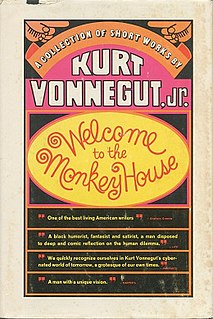 W
WThe Age of Wire and String is Ben Marcus's first book, published in 1995. The book is composed of 8 sections, divided into 41 parts, which combine technical language with lyrical imagery to form a sort of Postmodern catalog by turns surreal, fantastic, and self-referential.
 W
WLas armas secretas is a book of five short stories written by Julio Cortázar. The latter four stories appear in translation in the volume Blow-up and Other Stories ; the first, "Cartas de Mamá," has never been translated into English.
 W
WLos autonautas de la cosmopista is a book written by Julio Cortázar in collaboration with Carol Dunlop, who died shortly before it was published. It narrates the couple's extended expedition along the autoroute from Paris to Marseille during the months of May and June 1982.
 W
WBestiario is a book of eight short stories written by Julio Cortázar. All the stories were translated to English by Paul Blackburn and included in the collection End of the Game and Other Stories (1967). The "Cefalea" ("Headache") was translated in English by Michael Cisco in 2014 and published online by tor.com.
 W
WCanary in a Cat House is a collection of twelve short stories by American writer Kurt Vonnegut, published in 1961. Eleven of the twelve appear in the later collection Welcome to the Monkey House, with "Hal Irwin's Magic Lamp" being omitted. In a later collection of short stories, Bagombo Snuff Box, there is a story with that title although it is a different version.
 W
WCosmicomics is a collection of twelve short stories by Italo Calvino first published in Italian in 1965 and in English in 1968. The stories were originally published between 1964 and 1965 in the Italian periodicals Il Caffè and Il Giorno. Each story takes a scientific "fact", and builds an imaginative story around it. An always-extant being called Qfwfq narrates all of the stories save two. Every story is a memory of an event in the history of the universe. Qfwfq also narrates some stories in Calvino's t zero.
 W
WDays and Nights of Love and War is a 1978 book by Uruguayan writer Eduardo Galeano. It was published in English translation in 1982 by Monthly Review Press. Structured as a series of fragments, the book varies in tone from straight journalism to expressionism and poetic lyricism and in genre from short story to aphorism to biography. It established the formal and thematic qualities of Galeano's prose, and won the Casa de las Américas Prize in 1978.
 W
WThe Encyclopedia of the Dead is a collection of nine stories by Yugoslav author Danilo Kiš. Combining history and fiction in what critics have seen as a postmodern fashion, the stories have helped cement Kiš's legacy as one of the most important 20th-century Yugoslav authors.
 W
WFinal del juego is a book of eighteen short stories written by Julio Cortázar.
 W
WA Heartbreaking Work of Staggering Genius is a memoir by Dave Eggers released in 2000. It chronicles his stewardship of his younger brother Christopher "Toph" Eggers following the cancer-related deaths of his parents.
 W
WLost in the Funhouse (1968) is a short story collection by American author John Barth. The postmodern stories are extremely self-conscious and self-reflexive and are considered to exemplify metafiction.
 W
WMy Cousin, My Gastroenterologist is a postmodernist/absurdist book written by Mark Leyner, published by Vintage Contemporaries in 1990. Portions of it were originally published in Fiction International, Rolling Stock, Hallwalls Anthology, Esquire or Harper's Magazine before being compiled into its current form.
 W
WFrom the Observatory is the title of the English-language translation of Prosa del observatorio, a book of text and photographs by Julio Cortázar originally published in Spanish in 1972. The photographs depict the observatories of Maharajah Jai Singh; the text, largely in prose but with sections in verse, ranges meditatively over a number of matters, including eels.
 W
WThe Reception of Derrida: Translation and Transformation by Michael Thomas explores the cross-cultural reception of Jacques Derrida's work, specifically how that work in all its diversity, has come to be identified with the word deconstruction. In response to this cultural and academic phenomenon, the book examines how Derrida's own understanding of translation and inheritance illuminate the 'translation and transformation' of his own works. Positioned against the misreadings of deconstruction, the book traces the relationship between Derrida's concern with the ethico-political dimension of deconstruction and an authorial legacy.
 W
WThe Rush for Second Place is a posthumous collection of essays by William Gaddis. Edited and introduced by Joseph Tabbi, it was published in 2002 by Penguin Press at the same time as Gaddis's last novel, Agapē Agape. The contents were published in Great Britain with Agapē Agape as Agapē Agape and Other Writings by Atlantic Books in 2004.
 W
WThe Things They Carried (1990) is a collection of linked short stories by American novelist Tim O'Brien, about a platoon of American soldiers fighting on the ground in the Vietnam War. His third book about the war, it is based upon his experiences as a soldier in the 23rd Infantry Division.
 W
WTodos los fuegos el fuego is a book of eight short stories written by Julio Cortázar.
 W
WWelcome to the Monkey House is a collection of 25 short stories written by Kurt Vonnegut, published by Delacorte in August 1968. The stories range from wartime epics to futuristic thrillers, given with satire and Vonnegut's unique edge. The stories are often intertwined and convey the same underlying messages on human nature and mid-twentieth century society.